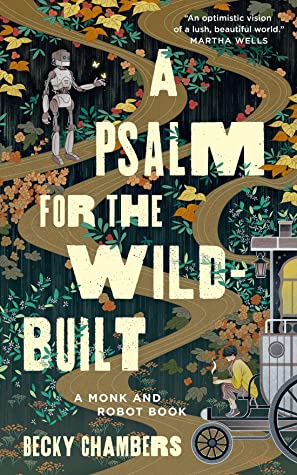
Genres: Queer Protagonists, Sci Fi
Representation: Nonbinary MC, queernorm world
Published on: 13th July 2021
ISBN: 1250236215
Goodreads

In A Psalm for the Wild-Built, Hugo Award-winner Becky Chambers's delightful new Monk & Robot series gives us hope for the future.
It's been centuries since the robots of Panga gained self-awareness and laid down their tools; centuries since they wandered, en masse, into the wilderness, never to be seen again; centuries since they faded into myth and urban legend.
One day, the life of a tea monk is upended by the arrival of a robot, there to honor the old promise of checking in. The robot cannot go back until the question of "what do people need?" is answered.
But the answer to that question depends on who you ask, and how.
They're going to need to ask it a lot.
Becky Chambers's new series asks: in a world where people have what they want, does having more matter?
I received this book for free from the publisher via NetGalley in exchange for an honest review. This does not affect my opinion of the book or the content of my review.
Highlights
~tea-monks!!!
~solarpunk ftw
~robots are the sweetest
~why not let crickets determine your life-choices???
I’ve got to be honest: I don’t feel like I have anything very special to say about Psalm. If you’re at all familiar with Becky Chambers, then you don’t need me to tell you about her signature feel-good factor and thoughtfulness and optimism. Or her wonderful worldbuilding, or her characters who always manage to steal your heart when you’re not looking!
I think the only thing that really needs emphasising is: Psalm is not the Wayfarers series. I don’t think everyone who loved Wayfarers will love Psalm, and I think a lot of those who do love both will love them for different reasons. It’s so easy to hope or assume that books by the same author will be the same, but they’re often not. This is one of those times.
For one thing, Psalm is even more small-scale than any of the Wayfarer books; instead of being focussed on a small group of characters, Psalm is all about Dex, a nonbinary monk (they/them) who decides one day that they want a change in career. Nothing super obvious sets off this decision, although Dex, charmingly, attributes it to the desire to hear the sounds of crickets. But they live in a very utopian, solarpunk society, and their superiors don’t mind at all that Dex now wants to be a travelling monk, making routes between villages and towns…to offer people tea.
Straight-up: all my years living in England could not make me like tea. But the idea of tea is still warm and lovely and soothing, and it is warm and lovely and soothing here. Dex really doesn’t know what they’re doing at first, but it’s heartbreakingly endearing – and once they do figure out what they’re doing, they kind of rock at it.
And then they meet…a robot.
Chambers has basically written a small, quiet meditation on the idea of human purpose: what we mean when we talk about it, where we get our ideas about it, how much it matters, how we’re supposed to find it. Dex insists that their world is not perfect, but it seems pretty perfect, and everyone’s basic needs are more than met – meaning that finding purpose is even more important than it might be otherwise. People who have to break their backs working don’t have the time, energy or resources to ponder their purpose, or go looking for one; in Dex’s world, where life is very comfortable, finding a purpose is much more vital. And you can kind of see why: humans get bored and fretful if we don’t have things to do. We think a lot – maybe too much. And if we don’t have to think about work and rent and groceries…? Then yes, a lot of us start to think about whether we matter, and what we should do so that we do matter, if we don’t. Etc. Or, if it’s not about mattering, then it’s about feeling fulfilled. Or happy – happy all the time.
It reminds me of something Chef thinks, in the very first Wayfarer book, A Long Way to a Small Angry Planet;
Humans’ preoccupation with ‘being happy’ was something he had never been able to figure out. No sapient could sustain happiness all of the time, just as no one could live permanently within anger, or boredom, or grief.
A Psalm for the Wild-Built, then, feels a bit like someone asked Chambers: but why can’t humans be happy all the time? And this novella is a little bit of an answer. It’s a sideways answer, and it’s not a whole answer; most of the novella is setting up the question, building up to it. And the answer is really another question. But it’s still an answer.
All in all? This is a quiet, sweet little story with a surprising bite when you’re least expecting it, and if you’re anything like me, you’ll keep thinking about it long after you finish it.






Leave a Reply